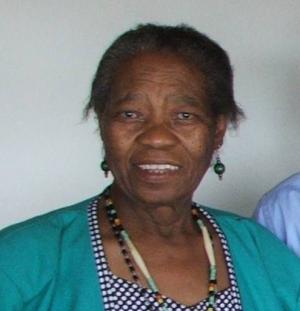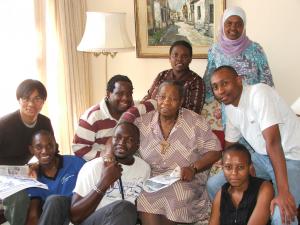Rev Motlalepula June Chabaku passed away in her home on 11 May after a long battle with diabetes and high blood pressure.
 Born on 19 November 1933 in Western Native Township, Johannesburg, Motlalepula was the second child in a family of seven. She attended secondary school in Soweto and went on to study as a teacher, a profession she always regarded as a calling. Many prominent South Africans were students of hers.
Born on 19 November 1933 in Western Native Township, Johannesburg, Motlalepula was the second child in a family of seven. She attended secondary school in Soweto and went on to study as a teacher, a profession she always regarded as a calling. Many prominent South Africans were students of hers.
Motlalepula achieved much in her life, attaining further qualifications in Drama, a Master of Divinity, a Bachelor of Liberal Studies, a degree in Adult Education, a degree in Guidance and Counselling, and a one year's special study on African Spirituality at educational institutions in the United Kingdom and United States.
Along with former President Nelson Mandela, she was one of the few surviving members of the African National Congress Youth League Programme of Action of 1949. In 1956 she was one of those who led a women's march to the Union Buildings in Pretoria, protesting against the hated pass laws.
As a young political firebrand, Motlalepula met the work of Initiatives of Change (then known as Moral Re-Armament). This led her to take part in numerous Initiatives of Change (IofC) initiatives in South Africa and in countries across the world.
 In 1996, in her capacity as Speaker of the Free State Provincial Parliament, Rev Chabaku co-hosted a IofC conference in the state capital, Bloemfontein, on the theme 'Healing the past, Building the future.'
In 1996, in her capacity as Speaker of the Free State Provincial Parliament, Rev Chabaku co-hosted a IofC conference in the state capital, Bloemfontein, on the theme 'Healing the past, Building the future.'
Her passion was always for the young. In 2008, Motlalepula was on the faculty of the Harambee Leadership Training Programme in South Africa, training young people from several African states in the spiritual and moral values and accountable leadership so needed on the African continent.
More than a 1000 people attended her State Funeral. Speaking on behalf of the President of South Africa, the Minister of Home Affairs, Dr Nkosazana Dlamini Zuma, described Motlalepula as 'one of the greatest our country has produced.' Minister Zuma spoke of her 'total commitment to liberation of our country without expectation of personal gain. Her sense of worth was not dependant on the wealth of possessions but on how she served her community.' She understood, Dr Zuma said, that liberation meant liberation spiritually, mentally and physically.
Speakers representing national and local government, the police force, faith-based organisations, family and friends, spoke of Motlalepula as a 'fearless patriot', 'a gentle giant', as having a strong sense of community and responsibility and that the world was 'her parish'. In the days before her passing she had rung a provincial radio station from her hospital bed and said that she wanted to pray for the nation. There and then she prayed, on air, for South Africa.
Another speaker likened her life of selfless care and never boasting about her achievements, to a river. 'The deeper the river, the less noise it makes.'
She is survived by her adopted daughter, Mamolemo, three grandchildren and her six siblings.
Pieter and Meryl Horn
Photos: Pieter Horn


